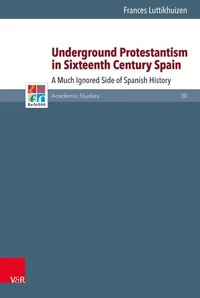Constantino de la Fuente (San Clemente, 1502–Seville, 1560). From acclaimed cathedral preacher to condemned "Lutheran" heretic
Par : , , , ,Formats :
Disponible dans votre compte client Decitre ou Furet du Nord dès validation de votre commande. Le format PDF est :
- Compatible avec une lecture sur My Vivlio (smartphone, tablette, ordinateur)
- Compatible avec une lecture sur liseuses Vivlio
- Pour les liseuses autres que Vivlio, vous devez utiliser le logiciel Adobe Digital Edition. Non compatible avec la lecture sur les liseuses Kindle, Remarkable et Sony
 , qui est-ce ?
, qui est-ce ?Notre partenaire de plateforme de lecture numérique où vous retrouverez l'ensemble de vos ebooks gratuitement
Pour en savoir plus sur nos ebooks, consultez notre aide en ligne ici
- Nombre de pages292
- FormatPDF
- ISBN978-3-647-56502-6
- EAN9783647565026
- Date de parution13/06/2022
- Protection num.pas de protection
- Taille3 Mo
- Infos supplémentairespdf
- ÉditeurVandenhoeck & Ruprecht
Résumé
During the first half of the sixteenth century the Spanish Inquisition fought "Lutheranism" in a benign way, but as time passed the power struggle between those that favoured reform and the detractors intensified, until persecution became relentless under the mandate of Inquisitor General Fernando de Valdés. The power struggle did not catch Constantino by surprise, but the tables turned faster than he had expected.
On 1 August 1558 Constantino preached his last sermon in the cathedral of Seville; fifteen days later he was imprisoned. Constantino's evangelising zeal is evident in all his works, but the core of his theology can be found in Beatus Vir, where he deals with the doctrines of sin and pardon, free grace, providence, predestination, and the relationship between faith and works. In his exposition of Psalm 1, Constantino does not resort to human philosophies but associates the spiritual fall of humanity with ugliness.
In his exhortation to the reader, he states: "we shall plainly see the repulsiveness of that which seems so good in the eyes of insane men, and the beauty and greatness of that which the Divine Word has promised and assured those who turn to its counsel."
On 1 August 1558 Constantino preached his last sermon in the cathedral of Seville; fifteen days later he was imprisoned. Constantino's evangelising zeal is evident in all his works, but the core of his theology can be found in Beatus Vir, where he deals with the doctrines of sin and pardon, free grace, providence, predestination, and the relationship between faith and works. In his exposition of Psalm 1, Constantino does not resort to human philosophies but associates the spiritual fall of humanity with ugliness.
In his exhortation to the reader, he states: "we shall plainly see the repulsiveness of that which seems so good in the eyes of insane men, and the beauty and greatness of that which the Divine Word has promised and assured those who turn to its counsel."
During the first half of the sixteenth century the Spanish Inquisition fought "Lutheranism" in a benign way, but as time passed the power struggle between those that favoured reform and the detractors intensified, until persecution became relentless under the mandate of Inquisitor General Fernando de Valdés. The power struggle did not catch Constantino by surprise, but the tables turned faster than he had expected.
On 1 August 1558 Constantino preached his last sermon in the cathedral of Seville; fifteen days later he was imprisoned. Constantino's evangelising zeal is evident in all his works, but the core of his theology can be found in Beatus Vir, where he deals with the doctrines of sin and pardon, free grace, providence, predestination, and the relationship between faith and works. In his exposition of Psalm 1, Constantino does not resort to human philosophies but associates the spiritual fall of humanity with ugliness.
In his exhortation to the reader, he states: "we shall plainly see the repulsiveness of that which seems so good in the eyes of insane men, and the beauty and greatness of that which the Divine Word has promised and assured those who turn to its counsel."
On 1 August 1558 Constantino preached his last sermon in the cathedral of Seville; fifteen days later he was imprisoned. Constantino's evangelising zeal is evident in all his works, but the core of his theology can be found in Beatus Vir, where he deals with the doctrines of sin and pardon, free grace, providence, predestination, and the relationship between faith and works. In his exposition of Psalm 1, Constantino does not resort to human philosophies but associates the spiritual fall of humanity with ugliness.
In his exhortation to the reader, he states: "we shall plainly see the repulsiveness of that which seems so good in the eyes of insane men, and the beauty and greatness of that which the Divine Word has promised and assured those who turn to its counsel."




